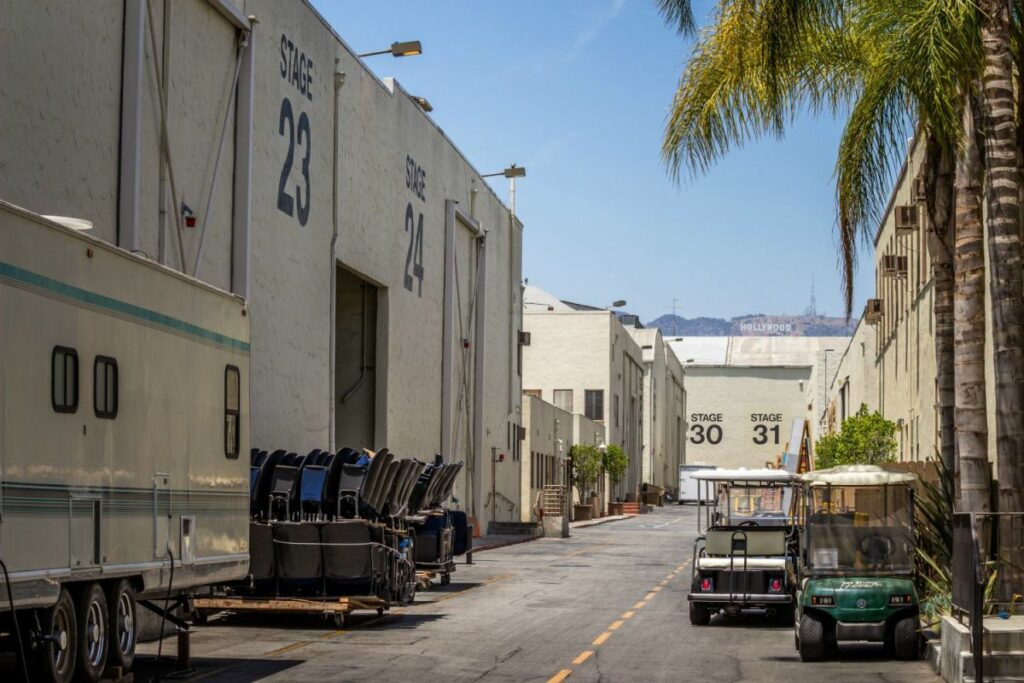Dan Vetanovetz, a set lighting technician of Local 728, completed work on the next “Star Wars” series “Skeleton Crew” in January 2023.
The show concluded a period that began in September 2020, during which he worked on projects such as “Westworld” and Ryan Murphy’s “The Prom.”
“There were so many times when people would text each other and ask, ‘Can you work tomorrow?’ and the response would be, ‘No, I’m booked.’ “It was nonstop,” Vetanovetz told IndieWire. “I started telling people, ‘I don’t want to raise your hopes. Can’t you text me? I’ll be stuck at this work for the next eight months. That was a lot, and everyone was going crazy.”
READ MORE: A Crew Member Died After An Accident On Marvel Studios’ ‘Wonder Man’ Production

But 2023 was “pretty sparse,” he admitted. He spent a couple days on advertisements. In September, he spent a week working on a low-budget union project that qualified for an interim agreement. He installed lighting fixtures during conferences. The highlight was replacing a stadium Jumbotron at Vanderbilt University.
Vetanovetz is already a year gone from his last full-time gig on a major television show or film.
“In 2019, you generally didn’t want to broadcast ‘I don’t have a job right now,’ because there’s always the [negative] thought that ‘Oh, Joe doesn’t have a job,'” he went on to say. “Everyone knows we’re all looking for work. “It’s expected.”

Vetanovetz is suffering one of many extended periods of unemployment among crew members. Some have been without a full-time job for almost a year, relying on day work, the occasional music video, or odd employment outside of film and television. Many in these close-knit communities talk about people quitting the industry entirely, losing their healthcare, their finances, or even, as one crew member informed us, a colleague committing suicide.
After the WGA and SAG-AFTRA strikes closed Hollywood for six months last year, it was expected that production would resume quickly once the strikes ended. When it didn’t, there were rumblings that things would resume after the holidays. That did not happen, either.
READ MORE: After Hollywood Strikes, L.A. City Council Decides To Speed Up Film And Television Production
“It’s never been so slow. “The economic situation for many crew members in general has been worse than the pandemic,” said Elyse Jackson, a digital asset manager of IATSE Local 871 who has been unemployed for 14 months. “Back then, we had government or studio funding, and we were considered vital workers. This time around, we only have each other. We don’t get enough assistance outside of our own community.”

There are still a large number of TV shows and movies being created, but the decline has been rapid when compared to the peak point in 2022. This month, FX CEO John Landgraf pronounced Peak TV, a term he originated, to be over. In 2023, FX’s research team counted 516 adult-centric live-action scripted shows, a 14 percent decrease from the previous year’s record 600 series. This is the largest drop in FX’s 20-year history of conducting this research.
That decline is creeping into 2024. According to data from production intelligence business ProdPro, global production spend fell by $14.7 billion last year, while global production starts fell by 24% in 2023.
According to ProdPro CEO and co-founder Alex LoVerde, while there was a post-strike rise in production, there has been a “significant decline” in series production volume year over year. LoVerde reported that 193 series were in production in Q1 2024, a 30% decrease from Q1 2022 and a 22% decrease from Q1 2023.
In 2023, film production in Los Angeles plummeted due to strikes. According to FilmLA data, it was down 32% from 2022, although each quarter showed a major reduction. According to FilmLA president Paul Audley, it generally takes six weeks for production to resume in the new year; but, this year’s timeframe is continuing to expand. While there is some permit activity, it is unclear if it involves high-value cast and crew from studio movies or smaller enterprises.
“The studios and the major streamers have talked about not only cutting back on the amount of programming, but also the number of episodes in series,” he went on to say. “That shortens the amount of time and the amount of work that happens.”

Back in February 2023, Audley reported that Los Angeles output was decreasing as studios prepped for a walkout. He believes there are hints that a potential IATSE or Teamsters strike is on the horizon. (Negotiations are scheduled to begin March 4.) For the time being, it’s difficult to determine what’s “normal” until he has a complete quarter of data.
Audley also stated that “it’s a national problem,” with film makers seeking for locales with the biggest incentives and rebates, even those overseas. For years, commercials shot in California were the typical backup for crew members when the film and television industries lagged; today, ads also seek rebates.
“We’ve started to feel a real loss of that part of the industry as well,” Audley went on to say.
According to one studio film production executive who spoke with IndieWire, the current situation “feels like a sprint,” with several film projects in the works while also scrambling to complete many strike-delayed films. They dismissed the likelihood of an IATSE strike, saying studios would be “foolish to repeat any mistakes we did last year.”

One concern stated by IATSE members is that studios would move more projects overseas in preparation of a strike. That’s implausible for a preproduction project—a big change in location boosts prep time, if not the budget—and the executive rejected any pivot or “whole cloth” shift to international productions. However, they did acknowledge that studios are always open to overseas opportunities.
The executive also stated that as actor and director schedules fill up, there is a bottleneck in what can be put on a studio’s picture slate for the year. When numerous high-priority initiatives attempt to run concurrently, others inevitably fail.
“I know films that have fallen apart because talent have had obligations to go into one movie or another, and now there’s this bottleneck,” the executive was quoted as saying. “I assume it’s similar for television. Everything has to start, and you can only have so many things going at once.

Maggie Anne Goll, an on-set special effects worker with IATSE Local 44, said she works in a close-knit environment and recognizes when things are slowing down.
“If any of us aren’t working, we notice,” she told me.
Her job might often involve blowing stuff up for major action sequences on FX’s “The Old Man.” Other times she’s performing “very tame, very boring” work, she’s forever glad to have been on series like “The Lincoln Lawyer” doing “wet downs” (aka getting the pavement wet so it looks good in the sunlight). However, production in Los Angeles is so slow that even simple tasks are handled by specialists with decades of expertise, leaving the newer team in the dust.
“You have really big department heads that have worked on huge projects doing this tiny little atmospheric and wet-down show because they’re available,” Goll told the audience. “So those of us who are newer, those of us who don’t quite have those credentials yet, obviously we keep getting knocked down the ladder of opportunity.”
Goll, who has been in the industry since 2018, has not worked full-time since April 2023. She was aware that the rise in streaming shows would not endure, but she had not anticipated that broadcast TV shows would also fade. She mentioned three gigs she planned to have at the end of last year that were pushed back owing to schedule conflicts with actors and talent — possibly into the summer, if she’s fortunate.

“I’m not certain about anything. “Don’t count your eggs until you’ve cracked them,” she said. “I am never without hope. I’m aware that the current situation will not last. I believe that the major studios and other AMPTP members are well aware that in the future IATSE discussions, we will use the same hammer that the WGA used.”
Craftspeople in Hollywood attribute the slowness to a variety of issues, including fewer shows, fewer episodes, productions departing for locations with greater tax incentives, rising business costs, inflation, and corporate greed.
Erin Wenrick, a women’s completed key costumer with Local 705 who has worked on “Licorice Pizza,” “Boba Fett,” and “The Rookie,” said managers or department heads are “overwhelmed” by the number of individuals out of work and applying for positions when there aren’t any available. Work on ads used to be a haven, but Wenrick said “you have to have the right mentality” for the fast-paced work that commercials require.
READ MORE: Hollywood Contraction: How Writers React To Ongoing Industrywide Cost-Cutting

“I wish I knew more about the shows that were happening. And I wish I knew who was on them,” Wenrick remarked. “But they’re staffed, and you don’t want to bother people for employment. So it’s kind of difficult.”
Wenrick stated that prior to Covid, it was difficult to locate someone in Los Angeles who would be available for day employment because most individuals were working full-time. Over the last year, she has solely worked during the day. She is hesitant to publish photographs of herself from set on social media, fearing that she will “make anybody feel bad” for not working.
“I really try not to oversell it, because I do understand what people are going through,” Wenrick said in a statement. “But, as far as people not talking about their jobs, I don’t want people to believe that they aren’t getting hired for a reason. I don’t want the folks I regularly work with to feel bad about not working because I couldn’t get them this job. They’re just attempting to protect themselves, their former coworkers, or their sentiments to some extent.”
Was it worth it?
The authors strike lasted 148 days, while the actors’ strike lasted 118 days. Lisa Gardner, another Local 705 customer, made the most of her time without work. Gardner, who usually worked 15-hour days, five days a week, joined the picket lines and created her own guild. As a member of the Contract Action Team, she is one of many IATSE members who are making a concentrated effort to communicate throughout negotiations.
“I’m out of work, I have nowhere to go, I have energy to expel, and I have a bit of an axe to grind because I love my job and I want to get back to it, and the CEOs are keeping me from doing the thing that I love,” Gardner said in a statement. “I’ve had nothing but time to grind that axe.” I am also not a monolith. Every area has [people like me], and they all do the same thing I do. This period has given us the bandwidth to communicate with one another. And we are discussing.”
Gardner stated that in the last year, she has seen coworkers return to the Midwest to live at home with their parents and leave the field permanently. She believes the IATSE and the AMPTP will reach an agreement, stating that “our industry is far too lucrative for it to go away forever.”

“Either you’re doing whatever you have to to pay your bills and survive, or you’re doing whatever you have to to occupy your mind to survive,” she told me. “I think we’re all in 100 percent survival mode at this point.”
Jackson has been out of work for 14 months, but she managed to accumulate enough work hours in 2022 to qualify for health insurance through her union until 2023. She will soon lose her present health coverage, but she did not mince words when she stated that IATSE’s forthcoming contract dispute is as existential as it was for writers and performers. The job stoppage “was painful, but it was worth it.”
“We all are trying to maintain our careers and survive, and we’re doing this because we love the industry,” he stated. “But we can’t have our passions and our love for our careers be used against us as a reason for us to be underpaid and overworked.”
Vetanovetz, too, is trying to stay cheerful. He feels that the current difficult situation will not last forever.
“Things will get better,” he said. “We’ll find a way. I believe that the true question that we are all asking right now is, “What do you want?” What do you deserve? This past year, I saw significant personal growth. Personally, I found it difficult but rewarding. And I believe it will be much more worthwhile a year from now.
Radiant TV, offering to elevate your entertainment game! Movies, TV series, exclusive interviews, music, and more—download now on various devices, including iPhones, Androids, smart TVs, Apple TV, Fire Stick, and more.


